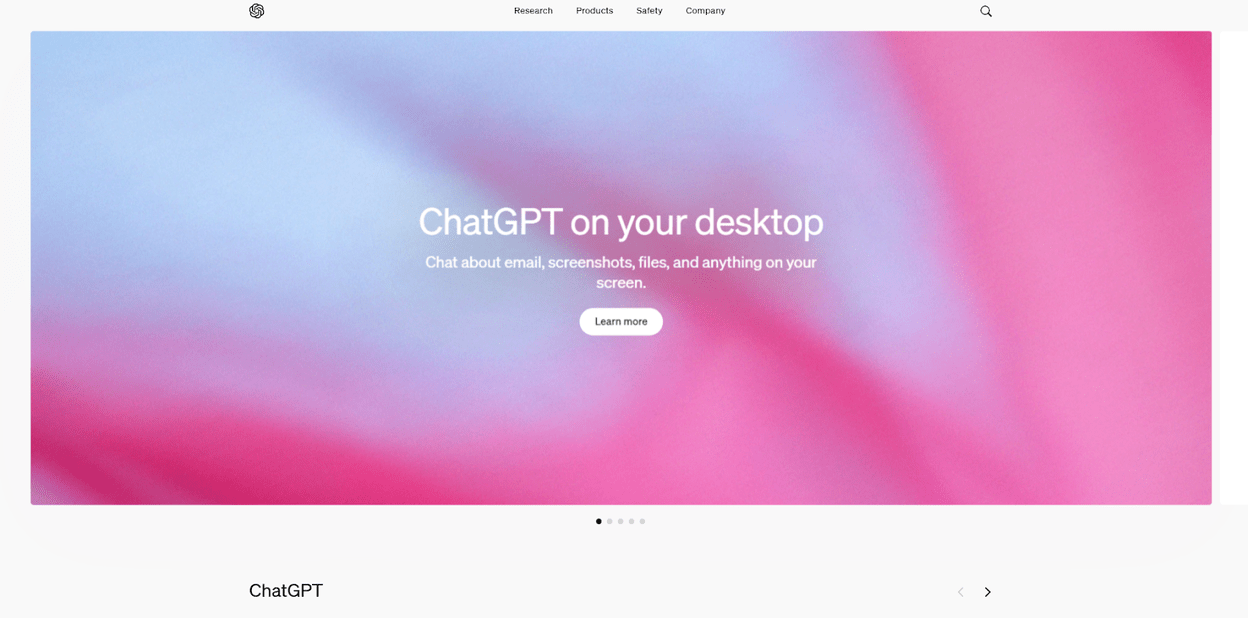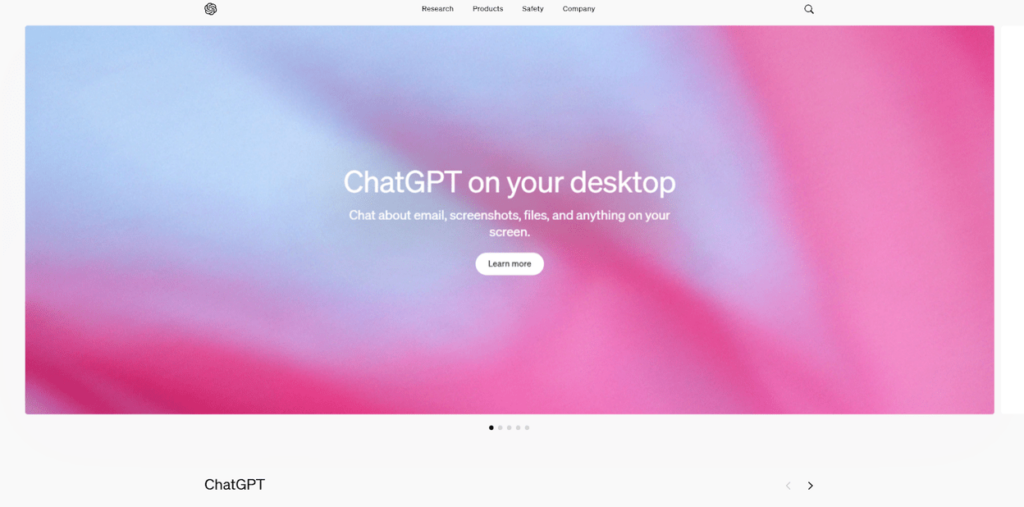Is OpenAI Safe?
Laura Martisiute
Reading time: 9 minutes

Table of Contents
If you use or plan to use a product made by OpenAI, you need to know: Is OpenAI safe?
Below, we explain whether OpenAI products like ChatGPT are:
- Safe to use.
- Good for privacy.
We also look at some steps you can take to improve both your safety and privacy when using OpenAI products.
What Is OpenAI?
OpenAI is an artificial intelligence (AI) research organization and technology company.

It was founded in December 2015 by Elon Musk, Sam Altman, Greg Brockman, Ilya Sutskever, Wojciech Zaremba, and John Schulman as a non-profit organization. However, to attract more funding and talent, it later established a for-profit subsidiary, OpenAI LP.
OpenAI is known for developing AI models like GPT-3 (Generative Pre-trained Transformer 3), DALL-E, and Codex. These models are used in various applications, including natural language processing, image generation, code generation, and more.
Is OpenAI Safe?
OpenAI provides access to its LLM models through APIs, which include usage policies to prevent misuse. Users must agree to these policies, which include restrictions on generating harmful or inappropriate content. Different access levels are provided to ensure that AI capabilities are not misused.
OpenAI monitors the usage of its models to detect and prevent misuse. This includes automated systems to flag suspicious activity. Regular audits are conducted to ensure compliance with ethical guidelines and to address any potential misuse.
Open AI says it places a strong emphasis on security to protect its technologies, data, and users. Data in transit and at rest is encrypted using industry-standard encryption protocols to prevent unauthorized access. Strict access controls are in place to ensure that only authorized personnel can access sensitive data. This includes role-based access controls (RBAC) and multi-factor authentication (MFA).
OpenAI uses secure cloud services and implements additional security measures, including physical security, network security, and regular security assessments.
Multiple security breaches have been associated with OpenAI, including a data leak following a hacker attack in February 2024 and a leak in March 2023 that exposed user payment data.
The security company UpGuard gives OpenAI a security rating of 819 out of 950. Their primary concern is that no valid Content Security Policy is implemented by OpenAI.
Is OpenAI safe to give phone number to?
Depends on who you ask.
Many internet users say that giving their phone number to OpenAI makes them nervous. Some even claim they’ve received more spam since sharing their number with OpenAI.
However, according to OpenAI, they only required users’ phone numbers for “security reasons.”
As of the time of this writing, OpenAI no longer requires phone verification (and consequently, sharing your phone number) for new OpenAI account creation or ChatGPT usage.

Is OpenAI safe according to Reddit?
No. The general opinion among Redditors seems to be that you can’t trust OpenAI—or any tech company for that matter (unless your trust makes money).

Is OpenAI safe to use?
Depends on what you’re using OpenAI for.
For example, when using ChatGPT, it is recommended to not share any personal and sensitive information. This is because OpenAI may use your content to train their models.

The data you input could be exposed in the event of a data breach.
Users should also be aware that AI-generated content might be inaccurate or misleading.
Similarly, OpenAI might also inadvertently generate or share content that violates laws or ethical standards.
Is OpenAI safe to pay?
It’s probably as safe to share your card number with OpenAI as it is with any other company, i.e., there’s always the risk of it leaking your details, either accidentally or through a breach.
In fact, it has already happened.
In 2023, a bug in ChatGPT led to the accidental exposure of the payment information of a small number of users, including credit card type, credit card expiration date, and the last four digits of credit card number.
OpenAI notified affected users, and, in a blog post describing the incident, said they’re confident there’s no ongoing risk to users’ data.

Many users recommend using single use virtual credit cards to prevent the leakage of payment details.
Is chat OpenAI safe?
Chat OpenAI (i.e., ChatGPT) is considered safe as long as you don’t share any personal information with it. Anything you input into ChatGPT can be used to train its models or end up exposed in a data leak or breach.
This isn’t hypothetical, either. OpenAI experienced a leak following a hack in February 2024 and another leak in March 2023 that exposed user information.
Also, don’t assume that the information ChatGPT produces is accurate.
ChatGPT is known to hallucinate. An AI hallucination is when AI generates false or misleading information. ChatGPT itself advises to “check important info.”

Is OpenAI ChatGPT safe?
Depends on what you mean by “safe.”
It’s generally recommended to not share anything with ChatGPT you wouldn’t share elsewhere online.
“The best assumption is that anyone in the world can read anything you put on the internet — emails, social media, blogs, LLMs — do not ever post anything you do not want someone else to read,” said Gary Smith, Fletcher Jones Professor of Economics at Pomona College in an interview with Mashable.
He also said that just like Google Search or Wikipedia, ChatGPT answers shouldn’t be taken at face value but rather fact-checked. ChatGPT is known for its “hallucinations.”
ChatGPT says so itself: “ChatGPT can make mistakes. Check important info.”
Is OpenAI Private?
Again, depends on your definition of “private.”
According to OpenAI, they are “committed to protecting people’s privacy.” The company says it follows the principle of data minimization, collecting only the data necessary to provide its services and improve its models.
Efforts are made to anonymize data to protect individual privacy and reduce the risk of identifying users from their data.
All data, both in transit and at rest, is encrypted using industry-standard encryption protocols, protecting it from unauthorized access. Strict access controls, using role-based access and multi-factor authentication, ensure that only authorized personnel have access to sensitive data.
Users have the right to access their data and request its deletion in accordance with privacy regulations. OpenAI provides mechanisms for users to exercise these rights.
OpenAI maintains transparency about how user data is collected, used, and protected, with a clear privacy policy outlining the information it collects.
Data collected by OpenAI is used for specific purposes, such as improving model performance and providing services. Data is not used for unrelated purposes without user consent. OpenAI seeks user consent where necessary, especially for data uses beyond the initial purpose for which the data was collected.
Users are given control over their data, including options to opt out of data collection where applicable and to manage their privacy settings.
Still, internet users have concerns. They are worried about how their data, especially sensitive personal information, is collected, stored, and used by OpenAI. They are apprehensive about the potential for data to be mishandled or inadequately protected.

There are also fears that personal data input into AI systems could be exploited for malicious purposes, such as identity theft, fraud, or other unethical activities.
Terms of Service; Didn’t Read (ToS;DR), a project that rates internet services’ terms of service and privacy policies, gives OpenAI a “Grade D.” This means “The terms of service are very uneven or there are some important issues that need your attention.”
ToS;DR notes the following concerns:
- Users’ personal data is used for automated decision-making, profiling, or AI training.
- Location data may be collected, used, and shared.
- Users are tracked on other websites.
- Users waive their rights to class action.
On the plus side, ToS;DR notes that OpenAI doesn’t sell user data, the service will notify users in advance if it wants to make material changes to its terms, and users can request access, correction, and/or deletion of their data.
How to Improve Your Safety and Privacy On OpenAI
Follow the steps below for a more private and secure experience on OpenAI.
- Understand privacy policies. Familiarize yourself with OpenAI’s privacy policy to understand how your data is collected, used, and protected. Be aware of your rights under privacy regulations like GDPR and CCPA, including the right to access, correct, or delete your data.
- Limit data sharing. Share the minimum amount of personal information necessary for your use case. Avoid including sensitive or personally identifiable information in your queries or data submissions. Where possible, use pseudonyms or anonymized identifiers instead of real names.
- Control access to your data. Keep your API keys secure, and do not share them publicly. Rotate your API keys regularly and use different keys for different applications to limit potential exposure. Set appropriate permissions for who can access and use your data. Ensure that only authorized individuals have access.
- Opt out of data collection. Utilize any available privacy settings to opt out of data collection or limit the extent of data collected. Check OpenAI’s platform for such settings or options. If you prefer not to have your data stored, request its deletion according to OpenAI’s privacy policy.
- Secure your communications. Ensure that any data you send to OpenAI is encrypted. Use HTTPS and other secure communication protocols. Use secure networks and avoid using public or unsecured Wi-Fi when accessing OpenAI services.
- Regularly review and audit. Regularly review access logs and usage reports to detect unauthorized access or unusual activity. If you integrate OpenAI with third-party services, ensure they have strong privacy and security practices.
Our privacy advisors:
- Continuously find and remove your sensitive data online
- Stop companies from selling your data – all year long
- Have removed 35M+ records
of personal data from the web
Save 10% on any individual and
family privacy plan
with code: BLOG10
news?
Don’t have the time?
DeleteMe is our premium privacy service that removes you from more than 750 data brokers like Whitepages, Spokeo, BeenVerified, plus many more.
Save 10% on DeleteMe when you use the code BLOG10.
















